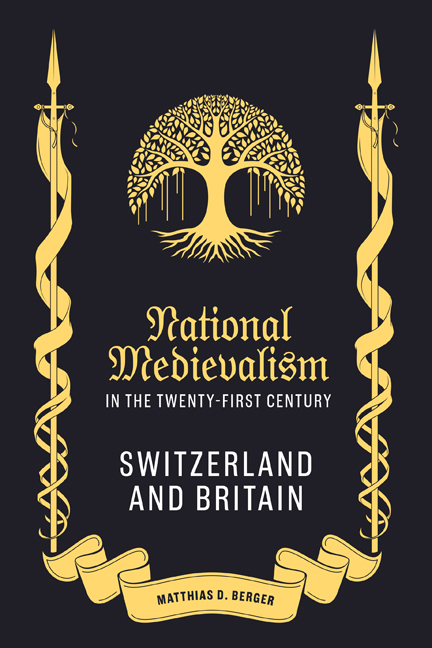Book contents
- Frontmatter
- Dedication
- Contents
- List of Illustrations
- Acknowledgements
- Author’s Note
- List of Abbreviations
- Introduction
- 1 Constructing Continuity: Four Nations Imagine Their Beginnings
- Part I The Politics of Autochthony
- 2 For Freedom Alone: The Scottish Independence Referendum
- 3 2016 and All That: Brexit
- 4 Freiheit statt Vögte: The Swiss National-Conservatives
- Part II The Others of National Medievalism
- 5 Masculine Middle Ages: Gender
- 6 In Strange Lands: Race, Ethnicity, Immigration
- Conclusion: The Demands of the Past
- Afterword: National Medievalism in the Age of COVID-19
- Bibliography
- Index
- Medievalism
Afterword: National Medievalism in the Age of COVID-19
Published online by Cambridge University Press: 17 December 2023
- Frontmatter
- Dedication
- Contents
- List of Illustrations
- Acknowledgements
- Author’s Note
- List of Abbreviations
- Introduction
- 1 Constructing Continuity: Four Nations Imagine Their Beginnings
- Part I The Politics of Autochthony
- 2 For Freedom Alone: The Scottish Independence Referendum
- 3 2016 and All That: Brexit
- 4 Freiheit statt Vögte: The Swiss National-Conservatives
- Part II The Others of National Medievalism
- 5 Masculine Middle Ages: Gender
- 6 In Strange Lands: Race, Ethnicity, Immigration
- Conclusion: The Demands of the Past
- Afterword: National Medievalism in the Age of COVID-19
- Bibliography
- Index
- Medievalism
Summary
WHEN THE GLOBAL pandemic hit Europe in early 2020, nationalist uses of the medieval past suddenly seemed a little more esoteric than they had only weeks before. And yet, the national Middle Ages would soon enough resume operations. Two years in, they appear to have taken on greater urgency, and in some cases downright feverishness, amid generally raised stakes. The medium- to long-term impact of the pandemic on national medievalism is harder to predict, however.
The debate about whether hard national borders are desirable is certainly being led more urgently now than it was before. This is relevant to my theme because the opening and closing of borders are not just neutral means of ensuring public health but, rather, come with precisely the kind of cultural-political baggage of nationalism that I have been talking about and are known to feed back into discourses of national identity. Border controls went up and barriers went down worldwide after the spring of 2020. While the (short-term) public health benefits of such measures are fairly uncontroversial, cautionary voices have pointed out that the closing of borders, carried out in the name of public health, may also end up serving nationalist, xenophobic and racist agendas long after the crisis has passed. ‘Infection as an excuse for nativism continues today’, writes Charles Kenny, and indeed we soon saw the understandable desire for national leaders to look after their own perverted into a sordid blame game. (During his final year as US president, Donald Trump, never one to miss an opportunity to provoke abroad to score points with a dubious audience at home, dubbed the new coronavirus ‘the Chinese virus’.) As many have pointed out, the only real solution to this global problem is a global response. However, responses have more often than not been disjointed and in too many cases guided by nationalist ideologies of exceptionalism. Perhaps predictably, as soon as the first vaccination campaigns got going at the end of 2020, so did the unedifying spectacle of vaccine nationalism.
- Type
- Chapter
- Information
- National Medievalism in the Twenty-First CenturySwitzerland and Britain, pp. 213 - 216Publisher: Boydell & BrewerPrint publication year: 2023



